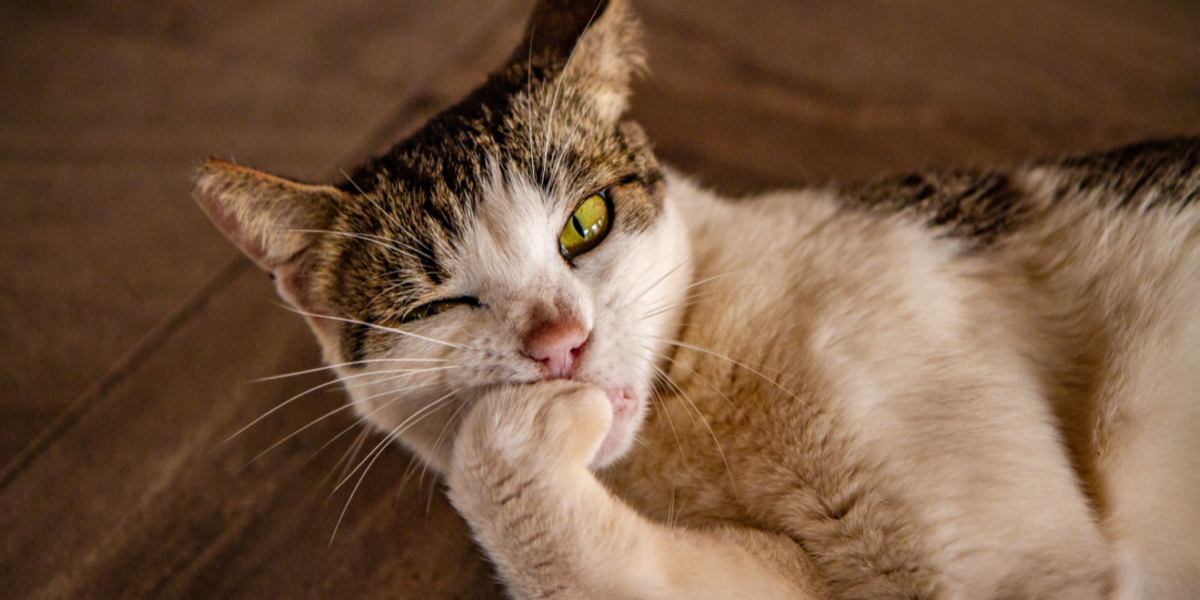
Cats can regularly be seen chewing on their nails, usually while grooming. Although nail-biting in humans is considered to be a bad habit and unhygienic, this is not the case for cats and it’s actually considered to be normal behavior.
Sometimes though, a cat’s nail chewing might become excessive and if this is the case, there’s usually an underlying medical or behavioral reason for it. Let’s take a closer look at why cats chew their nails and help you decide whether or not you should be concerned about your cat’s nail chewing.
What Are Cat Nails Made Of?
To understand why cats chew and bite their nails, we first need to know a bit more about cat nails and what they’re made up of. Cat nails are made from keratin which is a protein also found in hair and skin. In fact, it’s the same protein that our own fingernails are made from. In the middle of each nail is the quick which contains the blood vessels and nerves that supply the nail.
Cat’s nails (or claws) are made up of layers that are continually renewing. New layers form from underneath and as this happens, the oldest and most outer layer is shed, leaving behind a newer and sharper nail.
This cycle takes a few weeks to be complete and will happen continuously throughout your cat’s life. Each nail undergoes this cycle at a different rate so your cat will shed her nails on regular basis. This means that you’ll probably frequently find old claw husks around your household, particularly if your cat spends a lot of time indoors.
Cats require their nails to be in good working condition to enable them to hunt, climb, balance, and defend themselves, so this continual cycle of renewal is very important.
Also Read: Cat Claw Caps and Covers
Reasons Why Cats Chew on Their Nails
There are several reasons why cats chew on their nails and usually it is perfectly normal behavior. Let’s take a closer look.
Normal Grooming Behavior
We all know that cats are naturally clean animals and will usually groom themselves fastidiously. Your cat will chew her nails and use her teeth to remove dirt, litter, and other debris from in-between her toes and around her nails.
This helps to keep her clean and keep those sharp weapons in tip-top condition! She might also chew her nails to help remove a broken piece of claw. This is all part of your cat’s grooming regime and helps to maintain her high standards of good hygiene!
How Do Cats Shed Their Claws?
As we’ve already learned, cat nails renew continually as they are shed. Your cat will use her teeth and bite her nails to help speed this process along. She’ll chew her nails to pull off the old outer nail husks, revealing those sharp new claws underneath.
Scratching also helps to remove old, dead claw husks. Scratching is a natural, instinctive behavior and you can help discourage your cat from using your furniture and carpets to scratch on by providing her with plenty of suitable scratching posts and/or boxes. Some cats prefer to reach up and scratch and others prefer to stretch themselves out along the ground to scratch. Some cats will use a combination of both.
When Should I Be Concerned About Abnormal Nail Chewing?
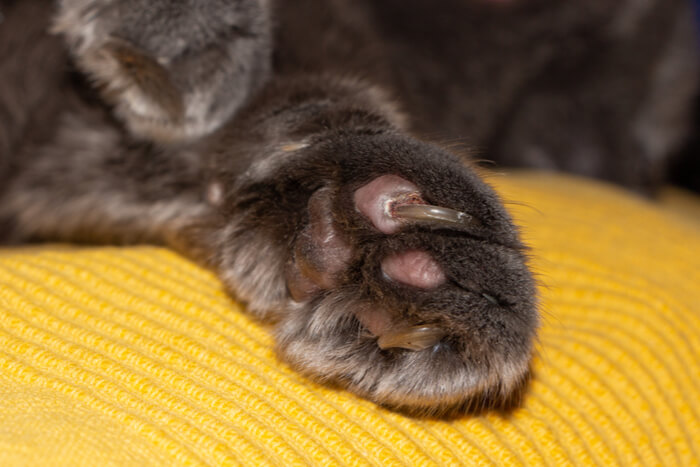
If a cat’s nails are not trimmed, they can grow until they puncture the paw pad, which is both painful and can cause an infection.
If your cat is chewing her nails excessively, or more than she has done previously, chances are there’s something wrong. Various medical and behavioral problems could lead to excessive nail chewing, so it’s important to take your cat to the veterinarian if you suspect she is chewing her nails more than she should be.
Medical Causes of Abnormal Nail Chewing
These are just a few of the more common medical conditions that could cause excessive nail-biting in cats.
1. Pemphigus
Pemphigus is a type of autoimmune skin disease in cats. There are several different types but pemphigus foliaceous is the type that most commonly affects cats. It results in skin lesions that are irritating and itchy, causing your cat to chew, scratch, and lick themselves excessively.
Your cat’s claws might also appear flaky. Skin lesions can be found anywhere on your cat’s body but are frequently found around the nail beds and often look crusty and sore. Your cat will chew her claws in an attempt to relieve the discomfort and clean the area but this can make the problem worse.
2. Ringworm
Ringworm (dermatophytosis) is actually not a worm but a fungal infection that can affect a cat’s skin. It usually results in patches of hair loss and dry, flaky skin. It can also affect the nails and can result in infection if left untreated.
Ringworm in cats often results in excessive grooming and sometimes excessive nail chewing if the nails or nail beds are affected. Ringworm is a zoonosis which means that it can be transmitted to humans.
Wash your hands well after handling your cat and avoid touching any skin lesions on your cat that look suspicious. Consult your doctor if you think your cat might have given you ringworm.
3. Nail Bed Infection
Nail bed infections can develop in cats for a number of reasons. They usually manifest as a swelling of the skin around the nail bed, often accompanied by a sticky discharge. Nail bed infections are painful and are another reason that your cat might be chewing her nails excessively.
4. Thick Brittle Nails in Older Cats
Older cats often develop thick nails that are more brittle. This is often due to a hormonal imbalance and usually isn’t too much to worry about. Your cat might chew her nails more often in an attempt to remove pieces as they flake away.
Older cats don’t tend to scratch or groom themselves as much, so keep an extra close eye on your older cat. She might need her claws regularly trimmed for her to keep them in good condition.
Behavioral Causes of Abnormal Nail Chewing
If medical problems have been ruled out by your veterinarian, it is likely that your cat’s abnormal nail chewing is down to anxiety. Some cats are naturally more anxious and these cats may have a predisposition to excessive nail chewing.
Anxious cats are often also predisposed to other obsessive-compulsive disorder behaviors such as over-grooming. Some breeds are more prone to these types of behaviors than others, such as Siamese and Burmese cats, but any cat can exhibit anxiety-related behaviors.
Excessive claw chewing in cats can also be caused by boredom and lack of sufficient mental stimulation. Or, it might be that there is a source of stress causing your cat’s anxiety. Sources of stress for your cat could include things such as loneliness, a new cat in the neighborhood, noisy building work, or a new baby in the household. It might even be that another cat in your household is making your cat feel unsettled.
What Can I Do To Help?

To reduce boredom, be sure to spend some time each day playing with your cat. terra incognita / Shutterstock.com
The first thing to do is reduce stress on your cat as much as possible. You can do this in several different ways. Firstly, ensure there are enough resources for all of the cats in your household. This includes food bowls, water bowls, litter trays, and sleeping areas.
The golden rule is that as a minimum, you should have one of every resource per cat in the house, plus one extra. You could also consider getting a Feliway plug-in pheromone diffuser for your cat. These are designed to help your cat feel happy and safe in their environment.
To reduce boredom, be sure to spend some time each day playing with your cat. This is especially important if your cat doesn’t go outdoors. You could try using feather teaser toys that your cat can chase and catch, or wind-up mice.
Catnip toys are often a favorite, although bear in mind that not all cats are sensitive to the effects of catnip. If your cat spends a lot of the day on her own, you can leave her with toys she can enjoy by herself. These don’t have to cost a lot of money – many cats love an empty cardboard box!
If your cat is still chewing her nails excessively despite your best efforts, then speak to your veterinarian who will be able to refer you to a qualified pet behaviorist. Sometimes, behavioral modification medications might be needed to break the habit.
Should I Cut My Cat’s Nails?
Most cats shouldn’t need their nails cutting as they will usually keep them in tip-top condition when grooming themselves and through the use of scratching posts. Sometimes, older cats might need regular nail trims to prevent their claws from catching on carpets, or from curling round and growing into their pads.
You shouldn’t cut your cat’s nails if they go outdoors because they could need them to defend themselves against predators. Ask your veterinarian if you are unsure.
Remember, nail chewing in cats is usually a completely normal behavior and most cats will chew their nails as part of their grooming routine to remove dirt or old pieces of nail.
Sometimes though, cats will chew their nails excessively and this is usually a sign of an underlying medical condition or behavioral problem. You know your cat best so if you are concerned that she is chewing her nails more than is normal, then speak to your veterinarian to get her checked over.
Also Read: Declawing Cats: What You Need To Know
Frequently Asked Questions
Is it normal for my cat to bite her nails?
Yes, it is normal for your cat to bite her nails. Cats bite and chew at their nails as part of their normal grooming routine. However, if your cat is biting her nails excessively, this could be a sign that something is wrong and you should take her to the veterinarian to get her checked.
Why does my cat bite and pull his nails?
New nail forms in layers from the inside out, so old nail will flake away from the surface of the nail. Your cat will bite and pull at his nail to remove these pieces of the old nail, revealing a sharp, new nail underneath.
Does my cat have anxiety?
Several behaviors might indicate that your cat has anxiety. These could include sudden changes in behavior, over-grooming, excessive vocalization, restlessness, hiding, or decreased appetite. It can be difficult to determine whether some cats have anxiety so speak to your veterinarian if you are unsure.
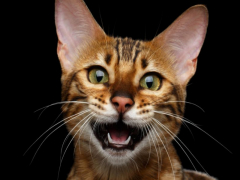


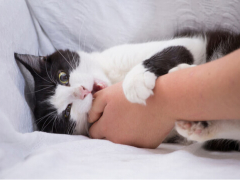



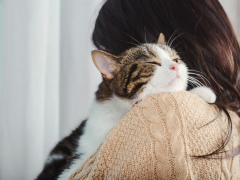
My cat has an injured claw and/or paw /pad. one of the toes is swollen almost doubled in size. The claw
attached looks like a sliver of a nail/claw and there appears a dark red colored dried blood.
I do not know what happened. I did trim his claws recently and have no recollection of cutting too far down.
Though I suppose I may have. He is avoiding walking on that paw. Mostly just walks on the other three, though mostly rests in a remote hiding spot in the house. Can you advise me at all? Thank you. We have been to the vet. He is on antibiotics. There is no diagnosis so far.
I doubt it was your fault. Perhaps your cat snagged his claw on something and yanked it a bit out from his paw. As long as you’ve consulted the vet and have him on antibiotics, I don’t think there’s much you can do besides let him rest as desired and wait for it to heal. Wishing you and your cat all the best.
Thank you so much. I agree with your comments and most likely that is what occurred. I appreciate your
response.
My car has a toy with plastic wand, it broke off, can’t find it, worried that maybe she ate it?